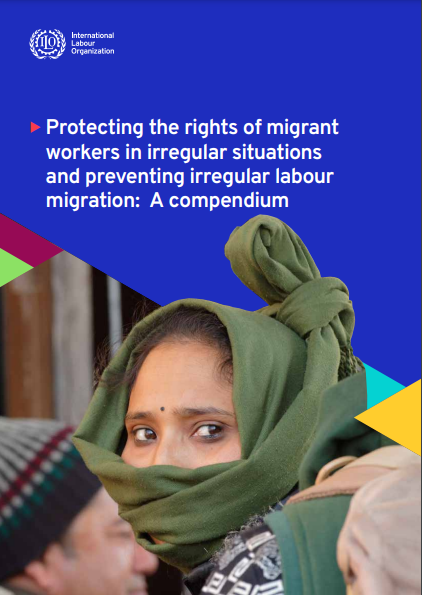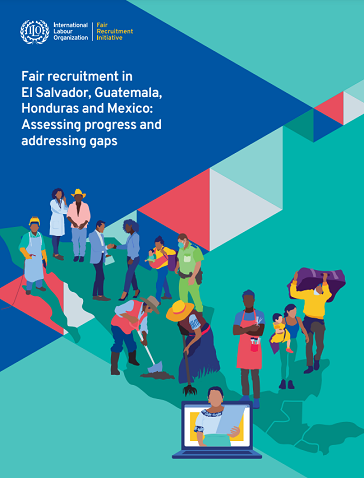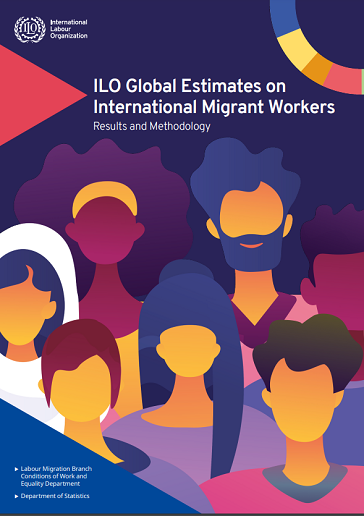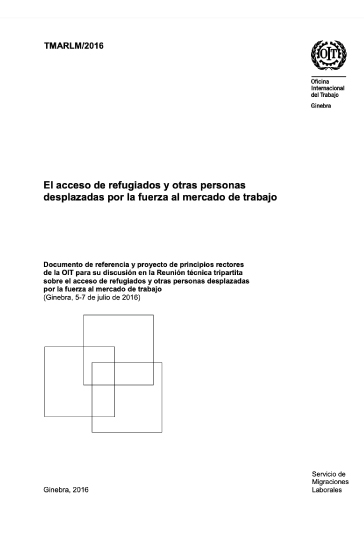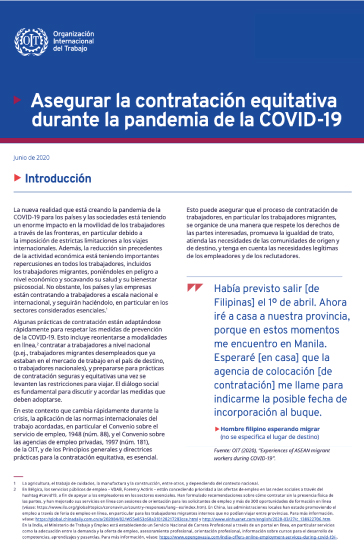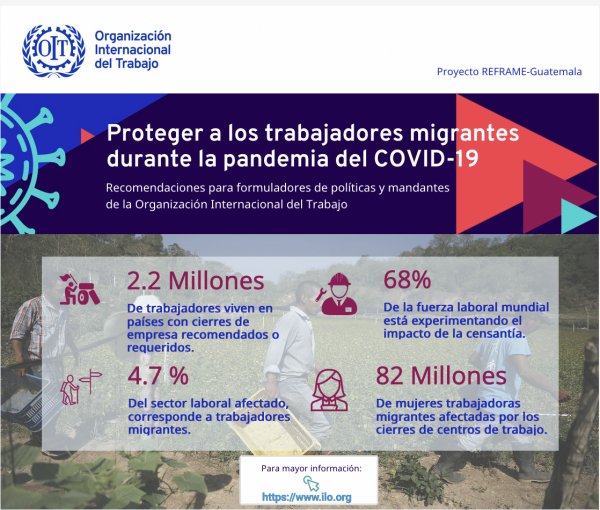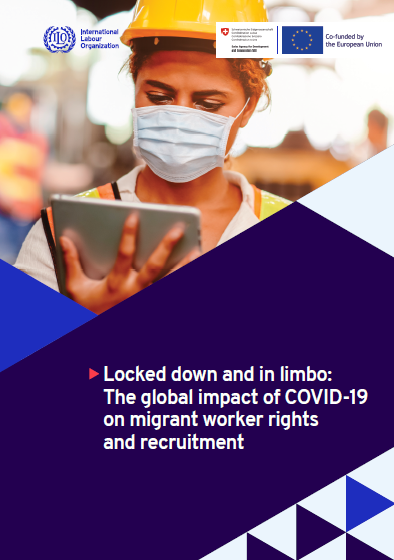Protecting the Rights of Migrant Workers in an Irregular Situation and Preventing Irregular Labour Migration: A Compendium
The Compendium presents the situations that can lead migrant workers into irregularity, the rights of migrant workers in irregular situations, and the relevant international standards and good practice. It highlights laws, policies and practices that can help prevent irregular labour migration, and facilitate respect and promotion of the human rights of all migrant workers, regardless of status”. The Compendium is not intended to be exhaustive but is instead a living document that will be regularly updated with new examples and experiences. It seeks to encourage the sharing of good practices by states, social partners, and other actors concerned and to contribute to the attainment of the objectives of the Global Compact for Safe, Orderly and Regular migration.
Some of the references will be further updated in early 2022.
Type of document :
Country/Region :
Year of publication :
Theme : , , , ,
Fair recruitment in El Salvador, Guatemala, Honduras and Mexico: Assessing progress and addressing gaps
Analysis of progress and gaps in the regulatory framework, policies and enforcement on fair recruitment in the region and in each country, with recommendations to address regional and national challenges.
The document also compiles cases, good practices and recent efforts in various sectors and regions at local and international level by governments, employers' organisations and workers' organisations.
Type of document :
Country/Region : , , , ,
Year of publication :
Theme : , ,
ILO Global estimates on international migrant workers: Results and methodology
This third edition of the ILO Global estimates on international migrant workers: Results and methodology presents the most recent estimates on the stock of international migrant workers, disaggregated by age, sex, country-income group and region, and the estimation methodology. The reference year is 2019. The report predates the onset of the COVID-19 crisis, which has affected the magnitude and characteristics of international labour migration. The estimates offer a benchmark against which the COVID-19 driven changes can be analysed in the future.
The periodic publication of this report provides information on recent trends on labour migration and therefore contributes to achieving the Sustainable Development Goals, as well as supporting policymaking at the country, regional and global levels.
Type of document :
Country/Region :
Year of publication :
Theme : ,
El acceso de refugiados y otras personas desplazadas por la fuerza al mercado de trabajo
Documento de referencia y proyecto de principios rectores de la OIT para su discusión en la Reunión técnica tripartita sobre el acceso de refugiados y otras personas desplazadas por la fuerza al mercado de trabajo.
Este documento de referencia y el proyecto de principios rectores de la OIT se han preparado con el fin de proporcionar una base y un marco para las deliberaciones de la Reunión técnica.
Type of document :
Country/Region :
Year of publication :
Theme : , ,
Asegurar la contratación equitativa durante la pandemia de la COVID-19
En el presente informe se destacan los principales desafíos de la contratación nacional e internacional de trabajadores durante la pandemia de la COVID-19, la respuesta de la OIT así como las políticas y medidas recomendadas. En el anexo se describen las prácticas de las partes interesadas para promover la contratación equitativa durante la pandemia de la COVID-19.
Type of document :
Country/Region :
Year of publication :
Theme : , ,
Protecting migrant workers during the COVID-19 pandemic
The infographic seeks to inform on the need to protect migrant workers during the COVID-19 pandemic by providing recommendations for policy makers and ILO constituents.
It provides facts and figures on Guatemalans abroad, return of Guatemalans in the US-Mexico corridor, family remittances and areas for action to promote bilateral cooperation between countries of origin and destination, inclusion of migrant workers in national responses and social dialogue.
Type of document :
Country/Region :
Year of publication :
Theme : , ,
Locked down and in limbo: The global impact of COVID-19 on migrant worker rights and recruitment
The COVID-19 pandemic has had a devastating impact on migrant workers and their access to decent work. Beyond the immediate public health crisis, response measures including lockdowns and border closures had specific implications for the hiring and employment conditions of migrant workers. These measures have increased the vulnerability of migrant workers at the same time as the economic and social dependence on migrant workers who deliver essential services such as healthcare and sanitation has deepened.
To chart and understand this impact in detail, the ILO commissioned a series of rapid assessments in some of the world’s most significant corridors for low-wage migrant workers. Completed in the initial months of the crisis (early to mid-2020), these assessments gathered primary data in the form of interviews and surveys from the perspective of migrant workers and key stakeholders (including governments, civil society, the recruitment sector, employers’ organizations, unions and workers’ organizations) engaged in migration governance, migrant worker deployment and the protection of the rights of migrant workers.
These rapid assessments provide valuable snapshots of the immediate impact of the pandemic and early responses to the pandemic on migrant workers in various parts of the world. Common themes emerging from the research also illustrate the ways in which the pandemic exacerbated existing inequalities and vulnerabilities experienced by migrant workers globally. These themes demonstrate the clear linkages between the impact of the pandemic on migrant workers and the structural causes of the inequalities and vulnerabilities embedded in many current labour migration processes and practices.
Drawing on the rapid assessments, this report provides a global picture of the impact of the crisis on migrant workers, and provides valuable recommendations for ensuring protection of migrant workers’ rights.
Type of document :
Country/Region : , , , ,
Year of publication :
Theme : , , , ,
Subscribe to the Fair Recruitment Initiative Newsletter
Sign up to receive news delivered to your inbox.

